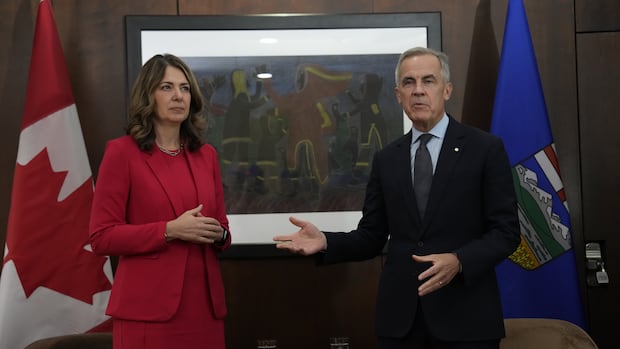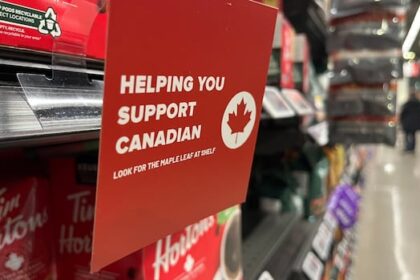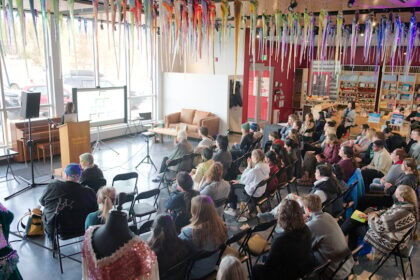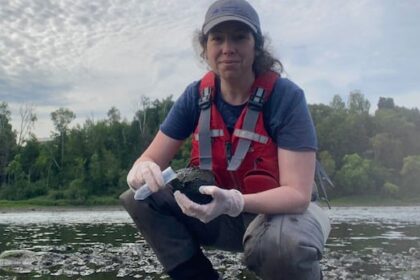November 2721 minutes agoSmith, Carney each pitch this deal as a winJohn Paul TaskerCarney signs the MOU with Smith in Calgary on Thursday. (Jeff McIntosh/The Canadian Press)Smith said she got Carney to back down on most of the Trudeau-era “nine bad laws,” as she calls them, that restricted oil and gas development in Alberta. Carney, meanwhile, says he got Alberta to buy into the Pathways carbon capture project to try and decarbonize the oil pumped out of the province.He also got a commitment from Alberta to hike its industrial carbon price, which wasn’t a sure thing before today.Importantly, both are framing this as a win for national unity.Smith said Carney has tamped down Alberta separatism with this move to unlock the province’s oil and facilitate a new pipeline to tidewater. Carney says this is an example of “co-operative federalism” at work.What’s to be seen is just how co-operative both sides will be with B.C., where Premier Eby has raised red flags about a pipeline to the northwest.Today’s bilateral memorandum of understanding does include a commitment to somehow cut B.C. in on what are expected to be substantial economic benefits from such a project, but how exactly that will be done is very much TBD. 22 minutes agoPipeline ‘never going to happen,’ say Coastal First NationsSamantha SchwientekA beach is seen in Sandspit, Haida Gwaii in August 2024. (Maggie MacPherson/CBC)Coastal First Nations have reiterated their opposition to a new pipeline in their territories and say they have no interest in the economic opportunities mentioned by Smith and Carney. “There is nothing in this MOU that overrides our inherent constitutional authority and stewardship responsibilities as the rights and title holders of the Central and North Coast and Haida Gwaii,” said the group of First Nations in B.C. in a news release.The group said it was looking for sustainable projects and not ones with “potential to destroy our way of life and everything we have built on the coast.”26 minutes agoWere any B.C. First Nations leaders present?Samantha SchwientekAt a news conference following the signing, Smith thanked “partners in Indigenous communities” who were present this morning.They included Alberta-based President of the Metis Settlement General Council Dave Lamouche, Alexander First Nation Chief George Arcand Jr., Chief of Alexis Nakota Sioux Nation Tony Alexis, Enoch Cree Nation Chief Cody Thomas and Cold Lake First Nation Chief Kelsey Jacko. Thunderchild First Nation Chief Delbert Wapass (from Saskatchewan) was also there. Smith did not mention if any current representatives from B.C. nations were there. Opposition from many First Nations in B.C. has focused on concerns about a pipeline’s impact on waters in their territories.27 minutes agoCould Guilbeault leave caucus? ‘I’m the prime minister,’ Carney saysVerity StevensonIdentity and Culture Minister Steven Guilbeault makes his way to a cabinet meeting on Parliament Hill in Ottawa, Tuesday. (Adrian Wyld/The Canadian Press)There have been questions about whether a deal with Alberta to remove the emissions cap and allow for a new pipeline would prompt Identity and Culture Minister Steven Guilbeault — who once held the climate change portfolio and is a staunch environmentalist — to leave the Liberal Party.Carney was asked whether that could happen now that the details are public. He repeated that the agreement “is only the beginning of a process” and comes with mechanisms to reduce emissions, such as carbon capture and boosting the industrial carbon price. A reporter then asked whether those measures would be enough for Guilbeault. Carney didn’t mince words. “It’s enough for the government of Canada. I’m the prime minister and my role is to make decisions in the interest of Alberta and Canada. What we’re seeking here are results,” he said. Carney said those results would include investment “on a large scale, right across Canada.”33 minutes agoMajor clean energy think-tank warns of bad precedentInayat SinghCarbon capture technology at Carbon Engineering in Squamish, B.C., is pictured during a B.C. election campaign in 2020. (Jonathan Hayward/The Canadian Press)The MOU could strengthen key policies to keep Alberta’s resources climate-competitive, according to the Pembina Institute think-tank, but could set the wrong precedent.”Today’s memorandum raises as many questions as it answers,” said Chris Severson-Baker, Pembina’s executive director, in a statement. “Most concerningly, it opens the door to not only Alberta — but any province — renegotiating new deals on federal climate policies, which will only serve to delay climate action and sow continued investment uncertainty, at a time when Canada must urgently attract private capital.”The energy policy think-tank is pointing out that the deal comes after years of Alberta weakening its carbon pricing system. The MOU has Alberta and Canada committing to bringing the carbon credit price back up in the province, which Pembina says is much-needed, but the exact details will matter when they come next April.47 minutes agoBringing carbon price back up key part of the dealInayat SinghThe Imperial Oil Strathcona Refinery, which produces petrochemicals, is seen near Edmonton in 2021. (Todd Korol/Reuters)Michael Bernstein, who heads the Clean Prosperity climate policy think-tank, told me that the credit price in the agreement is high enough to spur companies to invest in low-carbon tech, including spending billions on carbon capture.The deal sets a deadline of April 1 for Alberta and Canada to reach an agreement to ramp up the minimum price of carbon credits to $130.”I do see this as a positive step forward for climate policy, because it is a practical and hopefully enduring way to balance decarbonization and resource development,” he said.For context, carbon credits in Alberta are currently trading around $25 per tonne of carbon. These credits are held by companies that outperformed their emissions standards — a sort of reward that they can sell to other companies who go over their limits.But $25 is low, indicating there’s an oversupply of these credits in the market. Analysts say that’s stalling emissions improvements, which means strengthening this pricing system could be the most important climate outcome from this deal.59 minutes agoNuclear power, intertiesJohn Paul TaskerOntario Premier Doug Ford, left to right, Ontario Power Generation President and CEO Nicolle Butcher and Prime Minister Mark Carney are shown a piece of equipment at the Darlington Energy Complex in Courtice, Ont., in October. (Laura Proctor/The Canadian Press)Carney notes that there’s a commitment in this agreement to develop nuclear power in Alberta, but also new transmission interties to move clean electricity between Alberta, B.C., and Saskatchewan. That influx of nuclear power and clean energy from neighbouring provinces will help Alberta develop massive energy-hungry AI data centres, Carney said. That will onshore the storage of Canada’s data and information — the “sovereign cloud” Carney sees as a potential major project. “It’s a very ambitious and comprehensive partnership,” Carney said of his deal with Smith.1 hour agoCarney says deal is about more than a pipelineJohn Paul TaskerPipes run through Shell’s Quest Carbon Capture and Storage facility in Fort Saskatchewan, Alta., in 2021. (Todd Korol/Reuters)Carney says this agreement is “about much more than just a pipeline.” He says of course the pipeline is “an important component of this,” but it’s also crucial that Alberta has agreed to build Pathways Plus, a carbon capture initiative to make the oilsands less emissions intensive.As Smith conceded earlier, she was not a fan of carbon capture when she first entered the political scene — now she thinks it’s a good idea because of its potential to make Alberta’s oil and gas cleaner. The CO2 it captures can also be used for enhanced oil recovery, Smith said, meaning it can help dislodge more oil deep underground to extract.Carney said going forward on Pathways — which is itself a massive undertaking that will cost billions and employ thousands during construction — will make Alberta’s oilpatch “an entirely new industry” and make “Alberta energy competitive for the long term.” 1 hour agoCarney says B.C., First Nations would ‘benefit’ from pipelineVerity StevensonCarney asked if he’s willing to approve a pipeline even if B.C, First Nations don’t agree Prime Minister Mark Carney says the agreement signed Thursday between the federal government and Alberta is ‘the first step’ and added that several things have to happen before a pipeline is built, including a private sector proponent and ‘full partnership including equity ownership’ with Alberta and B.C. First Nations and the province of B.C.Carney was just asked by reporters what will happen with this deal if British Columbia — or First Nations — don’t agree to a pipeline on their territory. The prime minister replied that the deal is a “first step” and that “several things have to happen” before a pipeline can be built.Without a private investor in such a project, he said, “there’s no pipeline.”But he said the memorandum outlines “substantial economic benefits” for First Nations groups and British Columbia if a pipeline goes ahead. The agreement doesn’t include specifics on what those benefits would be for B.C. But it includes language around First Nations getting partial ownership of the pipeline.Carney said the MOU is about establishing the “necessary conditions” for a new pipeline.2 hours agoSmith says she trusts Carney to follow throughJohn Paul TaskerAlberta Premier Danielle Smith the 2025 summer meetings of Canada’s Premiers at Deerhurst Resort in Huntsville, Ont., in July. (Nathan Denette/The Canadian Press)Asked about whether Albertans can really trust a Liberal prime minister to follow through on a commitment to develop the province’s energy sector, Smith said Carney and others have had to “recalibrate” their thinking on conventional energy.She said wind, solar and batteries alone cannot power an industrial economy — and this memorandum of understanding is a recognition of that. She said global turmoil — the war in Ukraine and conflict in the Middle East — has forced leaders to rethink the value of developing oil and gas at home.”We will trust but we will verify,” Smith said of Carney and the federal government. “We have to proceed somewhere with a measure of good faith.” Smith said what’s different is that she thinks Carney understands the national unity issues that are at stake this time around. She said Trudeau “would have never moved this far on these issues.” “Justin Trudeau created the [Alberta] independence movement,” Smith said, and she counselled Carney that “he could take the wind out of it” by pursuing “good policy.”
Thursday, 5 Mar 2026
Canada – The Illusion
Search
Have an existing account?
Sign In
© 2022 Foxiz News Network. Ruby Design Company. All Rights Reserved.
You May also Like
- More News:
- history
- Standing Bear Network
- John Gonzalez
- ᐊᔭᐦᑊ ayahp — It happened
- Creation
- Beneath the Water
- Olympic gold medal
- Jim Thorpe
- type O blood
- the bringer of life
- Raven
- Wás’agi
- NoiseCat
- 'Sugarcane'
- The rivers still sing
- ᑲᓂᐸᐏᐟ ᒪᐢᑿ
- ᐅᑳᐤ okâw — We remember
- ᐊᓂᓈᐯᐃᐧᐣ aninâpêwin — Truth
- This is what it means to be human.
- Nokoma











